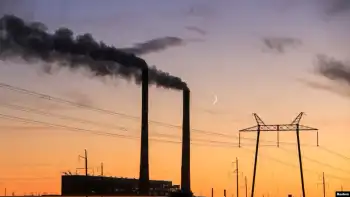Energy Panel Hears Conflicting Interests
LAKEWOOD, Colo. -- - A Bush administration panel on how to speed energy development in the Rockies heard recently from companies frustrated by what they consider bureaucratic delays and individuals fearful that oil and gas drilling will scar their land.
The Rocky Mountain Energy Council, made up of state and federal land managers, is studying how to increase energy production and avoid lawsuits blocking development in Colorado, Wyoming, Montana, Utah and New Mexico. It is an offshoot of the White House Task Force on Energy Project Streamlining.
Industry representatives told the council's first public meeting that its work is long overdue because energy demands keep rising.
Landowners said they fear the council is only interested in boosting production, with no concern for the environment or for ranchers whose land could end up dotted with wells.
"I'm more than concerned. I'm jittery," said Josh Joshwick, a commissioner in southwest Colorado's La Plata County, a hotbed of natural gas production since the 1980s.
"This council is not an end run around environmental regulations," said Robbie Roberts, head of the Environmental Protection Agency office in Denver and interim council chairman.
The council is simply trying to avoid the duplication of effort and find ways to make it easier for companies to do business, Roberts said. He said the council is also looking at ways to increase development of renewable energy, such as wind and solar power.
The Bush administration and energy companies are homing in on the region because it holds vast oil, gas and coal deposits.
A recent report by the Center of the American West at the University of Colorado said the region contains about 31 percent of the country's coal reserves, 41 percent of known and estimated natural gas reserves and 30 percent of the oil reserves in the Lower 48 states.
The government's role is key because so much of the land is public. Most of the 261 million acres overseen by the Bureau of Land Management is in 12 Western states. The Bush administration has directed the BLM to remove obstacles to development on its land.
The federal government retained many of the mineral rights when it granted homesteads in the West. Companies that buy or lease the rights are usually required to negotiate with landowners, but can drill over their objections.
Donna House, a Navajo from northern New Mexico, said while energy development has taken place for decades on reservations, tribal governments weren't invited to join the council. She contended the government also is ignoring federal laws designed to preserve Indian culture and sacred sites.
Robert Middleton, director of the White House task force, said he is working with Sen. Ben Nighthorse Campbell, R-Colo., to make sure tribes are represented on the council.
Industry representatives encouraged the panel to find ways to cut the time it takes to get a permit on federal land. Bruce Hinchey, president of the Petroleum Association of Wyoming, said the average wait for a permit ranges from 150 to 180 days.
Related News

Climate change: Greenhouse gas concentrations again break records
LONDON - The World Meteorological Organization (WMO) says the increase in CO2 was just above the average rise recorded over the last decade.
Levels of other warming gases, such as methane and nitrous oxide, have also surged by above average amounts.
Since 1990 there's been an increase of 43% in the warming effect on the climate of long lived greenhouse gases.
The WMO report looks at concentrations of warming gases in the atmosphere rather than just emissions.
The difference between the two is that emissions refer to the amount of gases that go up into the atmosphere from the use of fossil fuels, such…




